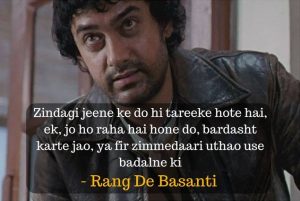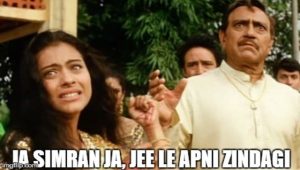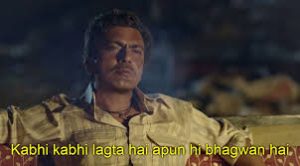Bollywood is more than just a source of entertainment for Indians. It’s a cultural phenomenon that shapes perspectives, sparks conversations, and leaves a lasting impact on our daily lives. From larger-than-life heroes and relatable struggles to iconic dialogues, Bollywood mirrors the dreams, aspirations, and values of millions. Its influence extends beyond the silver screen, often guiding how people perceive love, relationships, careers, and even money.
Beyond the romance, drama, and action, many iconic Bollywood dialogues hold surprising insights into managing money and building wealth. From taking smart risks to planning for the future, these cinematic gems often reflect financial principles that can guide us in real life. In this journey from screen to savings, let’s uncover the hidden financial lessons covered by the most memorable dialogues of Bollywood.
-
Risk Hai To Ishq Hai:

The famous dialogue “Risk hai to ishq hai” from the series Scam 1992 resonates deeply with personal finance. It highlights an essential principle of investing: greater rewards often come with calculated risks. In finance, this means stepping out of your comfort zone and exploring opportunities with the potential for higher returns, like equities or mutual funds, instead of sticking only to low-risk, low-return options like fixed deposits or savings accounts.
However, this doesn’t mean taking blind risks. Investments demand thorough research, a clear strategy, and awareness of your risk appetite. Diversification, proper planning, and a long-term outlook can help you balance the risks while aiming for meaningful financial growth. In short, taking risks is necessary for significant rewards, but the key is to take informed and calculated ones.
-
Don’t Underestimate The Power Of A Common Man:

The iconic Bollywood dialogue “Don’t underestimate the power of a common man” from Chennai Express offers a profound financial lesson: the potential of small, consistent efforts in wealth creation should never be underestimated.
It reminds us that financial success doesn’t depend on being extraordinary or having a large initial capital. It’s about taking steady, intentional steps, like budgeting wisely, saving regularly, and investing smartly. An “average” individual can achieve financial freedom by leveraging simple tools like SIP.
In personal finance, even modest savings or investments, when made consistently over time, can lead to extraordinary results. This is the power of compounding—a process where your returns generate further returns. A small SIP (Systematic Investment Plan) of ₹1,000 per month, for instance, can grow into a substantial corpus over the years.
Ultimately, just like the common man can achieve greatness through persistence and courage, your small financial actions, when combined with patience and discipline, can lead to remarkable wealth over time.
-
Itni Shiddat Se Maine Tumhe Paane Ki Koshish Ki Hai:

This famous dialogue from Om Shanti Om reflects the power of dedication and consistent effort; a lesson that applies perfectly to financial planning and achieving financial goals.
In personal finance, this translates to staying committed to your financial aspirations, whether it’s buying a home, building a retirement fund, or achieving financial independence. Just as every particle in the universe conspires to help you succeed when you’re persistent, small & consistent efforts in saving and investing add up over time, aligning to make your goals a reality.
This dialogue also teaches the importance of staying focused despite challenges. Market ups and downs, unexpected expenses, or setbacks might test your resolve, but staying consistent ensures you move closer to your goals.
The clear lesson is, that with enough effort, persistence, and patience, even the hardest financial dreams can become a reality. All it takes is a well-thought-out plan and the determination to see it through.
-
Zindagi Jeene Ke Do Hi Tareeke Hote Hain:

The famous dialogue “Zindagi jeene ke do hi tareeke hote hain… ek jo ho raha hai hone do, bardasht karte jao; ya phir zimmedari uthao usse badalne ki” from Rang De Basanti carries a powerful financial lesson: you can either passively let your financial situation dictate your life or take charge to create a better future.
The first approach reflects a mindset where people live paycheque-to-paycheque, avoid financial planning, and hope things will work out on their own. While this approach might seem easier, it often leads to a lack of control, financial stress, and missed opportunities for growth.
Taking responsibility for your financial life means creating a plan, setting goals, and actively working towards them.
This dialogue reminds us that while the easy way may seem tempting, true success comes from owning your financial journey and making deliberate choices to change your destiny.
-
Success Ke Peeche Mat Bhaago:

The iconic dialogue “Success ke peeche mat bhaago, excellence ka peecha karo, success jhak maarke peeche aayegi” from 3 Idiots provides a timeless financial lesson: focus on building a strong financial foundation with discipline and skill, and wealth will naturally follow.
Chasing quick success in the financial world like trying to time the stock market, falling for get-rich-quick schemes, or relying on speculative investments often leads to disappointment or losses. Instead of being consumed by the desire for wealth, concentrate on becoming excellent at managing your money through smart planning, disciplined execution, and continuous learning. Success, in the form of financial stability and wealth, will naturally “jhak maarke peeche aayegi”!
The dialogue also discourages running after materialistic benchmarks set by others. Instead, focus on your unique goals whether it’s early retirement, traveling the world, or securing your child’s education. Success looks different for everyone, and financial planning should be tailored to what matters most to you.
-
Jaa Simran Ja, Jee Le Apni Zindagi:

The iconic Bollywood dialogue “Jaa Simran jaa, jee le apni zindagi” from Dilwale Dulhania Le Jayenge offers a heartwarming financial lesson: the importance of financial freedom to live the life you truly desire.
Just as Simran is given the chance to pursue her dreams, financial freedom gives you the power to make choices that align with your goals and passions.
Simran’s story also highlights the balance between seizing the moment and planning. While it’s essential to save and invest for long-term security, it’s equally important to enjoy the present responsibly. Use budgeting tools like the 50/30/20 rule to strike a balance between needs, wants, and savings.
Just as Simran is encouraged to embrace her freedom and live her life, financial independence is the key to unlocking your dreams. By planning, saving, and investing smartly, you can achieve the freedom to make choices that truly bring you happiness and fulfillment.
-
Keh Diya Na, Bas Keh Diya:

The famous dialogue “Keh diya na, bas keh diya!” from Kabhi Khushi Kabhie Gham teaches a valuable financial lesson about setting firm boundaries and sticking to your financial decisions.
In personal finance, clarity and commitment are crucial. Once you’ve decided on your financial goals you need to stick to your plan, regardless of distractions or temptations. Saying “no” to unnecessary expenses or impulsive purchases is essential to staying on track.
In many cultures, including India, financial obligations often extend to family and social circles. While it’s important to help loved ones, it’s equally important to set boundaries. Politely but firmly communicate when a request doesn’t align with your financial priorities. Saying “Keh diya na, bas keh diya!” ensures you don’t put your financial well-being at risk.
This dialogue emphasizes the importance of decisiveness and resolve. Financial success isn’t just about earning more; it’s about making firm decisions, setting boundaries, and maintaining discipline. When it comes to your money, saying “no” at the right times can be as important as saying “yes” to the right opportunities.
-
Aadami Ka Sapana Tut Jata Hai Na…

The affecting dialogue “आदमी का सपना टूट जाता है ना, तो आदमी खत्म हो जाता है।” from the movie Angrezi Medium underscores a profound financial lesson: dreams and aspirations are essential for a meaningful life, but achieving them requires careful planning and resilience.
This dialogue highlights how our dreams are central to our motivation and sense of purpose. However, dreams can shatter if they aren’t backed by realistic financial planning. Setting clear, achievable financial goals ensures your dreams don’t just remain wishes but turn into actionable plans.
Life is unpredictable, and setbacks like medical emergencies or job loss shouldn’t stop your dreams. Build an emergency fund to stay resilient during tough times. The dialogue also reminds us that setbacks are part of life. Financial markets may fluctuate, unforeseen expenses may arise, or goals might take longer to achieve than planned. Instead of giving up, adapt your strategies, stay disciplined, and keep working toward your dreams. Balance ambition with prudence to avoid turning your dreams into nightmares.
-
Kabhi Kabhi Lagta Hai Apun Hi Bhagwan Hai:

The iconic dialogue “Kabhi kabhi lagta hai apun hi bhagwan hai” from Sacred Games provides a powerful financial lesson, overconfidence can be dangerous in financial planning. Don’t overestimate your abilities or market knowledge; seek expert advice when needed.
The dialogue serves as a cautionary tale against overconfidence. Feeling invincible can lead to poor financial decisions, such as taking on excessive debt or risky investments, ignoring diversification in your portfolio, and assuming market success will last forever without planning for downturns. Remember, markets can be unpredictable, and even the most seasoned investors face losses. Being proactive yet cautious is essential. Financial success isn’t about ego but about sustained effort and adaptability.
-
Beta, Tumse Na Ho Paayega:

The iconic Bollywood dialogue “Beta, tumse na ho paayega” from Gangs of Wasseypur 2 delivers a subtle yet profound financial lesson: don’t let self-doubt or external negativity stop you from achieving financial success. Success is possible with knowledge, discipline, and persistence.
This dialogue reflects a mindset many people face when they think financial planning or investing is too complicated. Whether it’s fear of understanding the stock market, apprehension about starting a SIP, or managing debt, the belief that “you can’t do it” often prevents action.
Often, others may underestimate your ability to manage money, especially if you’re new to financial planning. This dialogue is a reminder to focus on your journey and not be influenced by external criticism. Surround yourself with supportive voices, and seek advice from professionals if needed.
Even if you’ve made financial mistakes in the past like overspending, accumulating debt, or losing money in risky investments it doesn’t mean you can’t succeed. Learn from these experiences and use them as stepping stones for better decisions in the future. Persistence and long-term thinking are key. Prove to yourself and the world that you can achieve your financial goals.
-
Apana Time Aayega:

The famous dialogue “Apna time ayega” from Gully Boy serves as an empowering reminder of perseverance, patience, and the eventual reward of hard work, all of which are crucial lessons in personal finance. It reflects the idea that with consistent effort, focus, and the right strategy, you can achieve financial success, even if it takes time.
“Apna time ayega” is about believing in the process. In personal finance, the road to wealth creation is often long and requires consistency. It takes time for your efforts to compound and yield results. Just like the journey of a rapper building his career, your financial journey requires persistence and belief in the outcome. The dialogue encourages you to stay focused on your goals, even when short-term challenges arise.
-
Main Udna Chahta Hoon, Daudna Chahta Hoon, Girna Bhi Chahta Hoon, Bas Rukna Nahi Chahta:

The famous dialogue “Main udna chahta hoon, daudna chahta hoon, girna bhi chahta hoon, bas rukna nahi chahta” from Ye jawaani he diwani holds a powerful financial lesson. It highlights the mindset needed to face challenges, overcome setbacks, and continue progressing toward your financial goals, no matter how difficult the journey may be.
The dialogue also emphasizes the passion and determination required to reach your financial goals. Building wealth or achieving financial freedom requires a deep commitment and belief in your financial plan. It’s not just about making money; it’s about dedicating yourself to the process.
The dialogue teaches us the importance of resilience, taking calculated risks, embracing failure as a stepping stone, and staying consistent in our financial journey. With time, effort, and persistence, financial success will follow.
-
Zindagi Toh Har Roz Jaan Leti Hai, Bomb Toh Sirf Ek Baar Lega:

The dialogue “Zindagi toh har roz jaan leti hai, bomb toh sirf ek baar lega” from Jab Tak Hai Jaan teaches a key financial lesson: life’s daily financial struggles must be managed, but major crises require preparation.
While regular financial challenges like bills, inflation, or market fluctuations occur daily, unexpected major events like job loss, health emergencies, or economic downturns can hit hard. The key lesson is to be proactively prepared for such risks.
Start by building an emergency fund, ideally covering 3-6 months of expenses. Invest in insurance to protect against health or life crises, and diversify investments to shield your wealth from market downturns. Regularly monitor your finances, live within your means, and manage debt effectively.
Planning for both everyday expenses and unexpected life events ensures that you’re resilient, even in the face of major financial setbacks. With the right preparation, you can withstand the “bomb” and thrive despite life’s ongoing challenges.
-
Paisa Hi Paisa Hoga:

The dialogue “Paisa hi paisa hoga” from Phir Hera Pheri carries a vital financial lesson: the power of money and the pursuit of wealth, but also the responsibility that comes with it.
The characters in the movie are obsessed with getting rich quickly, believing that more money will solve all their problems. This reflects a common mindset—chasing wealth without understanding the consequences. In reality, financial success requires careful planning, patience, and a focus on long-term goals, rather than seeking shortcuts or quick gains.
The lesson is to approach wealth creation strategically. Invest wisely, save regularly, and diversify your income sources. Instead of trying to make a quick fortune, focus on building wealth gradually through consistent efforts. Financial security is achieved by managing money responsibly, not by reckless pursuits. The dialogue highlights the danger of greed and the importance of financial discipline in achieving sustainable success.
-
Aane Wala Pal Jane Wala He:

The dialogue “Aane Wala Pal Jane Wala Hai” from Golmaal carries an insightful financial lesson about embracing the transient nature of life and understanding the importance of timing in financial decisions. It reminds us that everything is temporary, and this includes both opportunities and challenges in our financial journey.
From a financial perspective, it teaches the value of seizing the moment. Whether it’s an investment opportunity, a job offer, or a chance to save money, timing is crucial. Waiting for the perfect moment often leads to missed opportunities. The dialogue encourages us to take action when the time is right, rather than procrastinating or overthinking.
However, it also reminds us that time waits for no one, which underscores the importance of starting financial planning early. The future will come quickly, and if we don’t act now by saving, investing, and managing debt, we may regret it later. Embrace the present, but always think ahead. Keep a balance in saving, spending, and investment, and enjoy every moment of life.
To conclude, Bollywood, with its vibrant storytelling, often imparts valuable life lessons, and financial wisdom is no exception. The iconic dialogues of Bollywood offer profound insights into managing money. By reflecting on these lessons, we can make smarter financial decisions, balance present enjoyment with future security, seize opportunities, and prepare for life’s uncertainties. Ultimately, Bollywood teaches us that economic success, like any great story, requires both patience and action.
